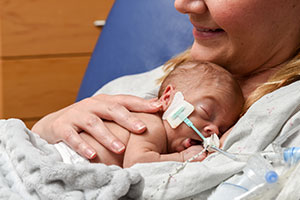Breastfeeding Your Baby in the St. Louis Children’s Hospital NICU
At St. Louis Children’s Hospital, we believe that breast milk is the best first food for your baby. It’s rich in nutrients and helps protect your newborn from infections and illness. Breast milk is like a special medicine created just for your baby, and its benefits include:
- Easier for infants to digest compared to formula
- Improved neurodevelopmental outcomes and antibodies to protect your newborn from infection
- An opportunity for you to actively participate in your baby’s care

Breastfeeding in the NICU
If your baby has been admitted to our newborn intensive care unit (NICU), you might be wondering if you’ll be able to breastfeed. Many babies in the NICU will not be able to directly breastfeed for some time; however, moms can still deliver the benefits of breast milk to baby by pumping. While you recover from childbirth, you may send your milk to your baby in the NICU. Expressed breast milk is then given to baby by bottle, feeding tube or a combination of these.
Once you’re able to visit your baby in the NICU, a practice called kangaroo care, or skin-to-skin, can help you successfully breastfeed. Kangaroo care is a technique for caring for premature babies or infants with low birth weight that involves holding them on your bare chest. This skin-to-skin contact helps with bonding, and it can also increase your breast milk supply and ensure continued success with breastfeeding.
Resources for breastfeeding in the NICU
At St. Louis Children’s Hospital, we support you in your breastfeeding journey. To help you along, our NICU features:
- A hospital-grade electric breast pump in every room and private lactation rooms in pod areas that are equipped with electric breast pumps.
- Nurses who are trained in lactation support as well as lactation consultants who will partner with you as you begin breastfeeding. These providers can answer questions and will help set you up with an electric breast pump for establishing your milk supply at home.
- Areas where you can store expressed breast milk for your baby as well as sterilize your pumping equipment.
- Educational materials to help you on your breastfeeding journey. Download our NICU Lactation Guide.
- Free meals in the hospital cafeteria. The NICU staff will tell you more about this when you are oriented in the NICU. Good nutrition will help establish your milk supply.
What to bring to the NICU for breastfeeding
Once you’re able to visit your baby in the NICU, or after you’re discharged from the hospital, we recommend bringing:
- Cold or frozen breast milk that you have pumped while away from the hospital.
- A water bottle or cup with a lid to hydrate while you visit your baby. It’s important to drink plenty of fluids while you’re breastfeeding or providing breast milk.
- A button-down shirt so you can hold your baby skin-to-skin. You may want to leave the shirt at your baby’s bedside when you go home so baby can smell you. This helps promote bonding and comforts your baby. Hospital gowns are also available.
- Any questions for your baby’s nurse, physician or the hospital’s lactation consultant.
More to consider
If you are not planning to breastfeed, know that pumping your milk — even for a few weeks — still offers excellent health benefits for your baby. We encourage you to speak with your doctor and other staff about your decision to provide milk for your baby.
We understand that breastfeeding and pumping can be challenging at first, and we’re here to help. If you ever have any questions or concerns about breastfeeding or pumping, your baby’s nurse and lactation consultant can assist you.










